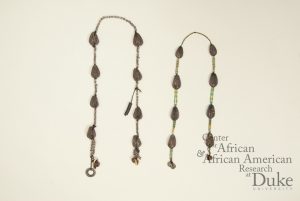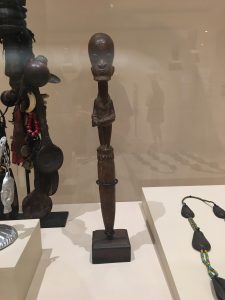

I am studying three components of Ifa Divination; the tapper, the divining tray and the pair of divination chains. The tray is what Ifa Divination is performed on, the chains are used to tell a story from the way they lay on the tray, the tapper is used to communicate with the gods, spirits and ancestors. I want to study these objects because they are part of a very important ceremony that many people practicing this Yoruba religion do, and they do this quite often. This is a tool used to give them guidance and help them understand what may be going wrong in their life and instead of accepting that, they wish to fix it. I want to be able to understand the symbolism of these objects when performing such an important process. I want the learn these things in order to help the reader understand how this religion works. I want them to understand that they believe in something that is bigger than themselves, that they are a humble religion and aren’t afraid to ask for help when they need it. I want the reader to understand why these Yoruba people do certain things in their religion that may be foreign to the reader but after reading will then be clear.
Throughout this course it has been a reoccurring theme that the Yoruba religion is looked down upon by outsiders and they look at it as if the religion doesn’t mean anything. Ifa Divination is a way that the people of this religion learn to cope with their problems. These people are strong in the fact they have somebody or something to go to in a in their life when things aren’t going as planned. I believe that more people should be able to admit when they need help, making them a stronger person, and that’s exactly what the Yoruba people are doing. They want to set their life straight, they have a path and they don’t wish to stray from it. On a Divination tray each corner means something. There are ancient forefathers that are displayed on the board. There is a quote from the reading “The Yoruba World” by Drewal, Pemberton and Abiodun that states “when you work, work, work your name will remain in history. That Ona Munu is one of the hard-working, ancient diviners, and he became so famous that we shall remember his name forever.” (23) This is important to the Yoruba people, meaning that all the work they put in will be paid off, they will be grateful for all their work they put in and maybe they will be recognized too. There is another forefather Ona Oganran, they say “His way was straight, a straightforward person…a good man.” (23). Again this also reflects how the Yoruba people are as a religion. They want to get to the point, they want to know what can be done to make sure they are on the right path in life. All these beliefs and these meanings comes from Ifa Divination, this process reflects how they are as a people and how they go about their way in lie. Which to me is inspirational, they aren’t afraid to ask for help, or to seek guidance, something many people should learn how to do, including myself. For this I admire the Yoruba people and wish to know more about their ways.
In order to find this information about Ifa Divination I will need outside resources such as primary resources. These will be articles about a Ifa Divination performance or they could be personal stories from people who have participated in Ifa Divination. I will use the resources provided by the library to obtain these articles and stories. I will also need secondary sources such as book based on the Yoruba religion that may have further explanations of this process. There may also be a film that shows Ifa Divination being performed. If I can find a film, a newspaper article or story and a book that further explains the process from an outsider point of view I should be able to get all the information I will need in order to complete my research.
(Alyssa Falco)
